Nearly 10 percent of the Pope's tweets include the word "mercy." This is no accident. Part of the pope's ambitious renewal effort is to make the Church more merciful. Rather than a place where sinners feel judged, Francis envisions a Church where people turn for comfort. His point is that we are all sinners, even our beloved popes, and the Church must respond to this reality with mercy, not condemnation.
"I am a sinner," the pope said when asked who he is by the Jesuit journal La Civilta Cattolica -- a line he's repeated many times since. Embracing a man whose face is covered in boils, washing the feet of a young Muslim woman, praying with the disabled: the most iconic images of this papacy are rooted in mercy.
What Francis has modeled conveys a simple truth -- mainly that Jesus's ministry was rooted in mercy, and our interactions with our families, friends, neighbors, and fellow Christians should be as well -- from Francis himself as the Bishop of Rome to his cardinals, bishops, and priests, all the way to religious and laypeople who comprise the majority of the Catholic Church. The goal is a more merciful world, ushered in by a more merciful Church.
Four days after his election, Francis preached Mass in the chapel at his residence, Casa Santa Marta. He said, quite simply, mercy is the Lord's most powerful gift. Even the most casual observer of the Francis papacy must realize that his sentiment drives so much of what the pope does.
As the Jesuit priest and author James Martin noted in The Washington Post, there were many possible story lines following Francis's historic visit to Rio for the 2013 World Youth Day: record crowds, security mishaps, and the best indication to date that Francis was a global superstar. But the one that took the media by storm was the pope's off-the-cuff remarks about mercy, spoken from the papal plane en route back to Rome. Francis was asked about gay priests, but he zoomed out a bit to talk about gay people generally. "If a gay person is searching for God, who am I to judge?" he replied. (I'm sure I wasn't alone when I thought, You're the pope, that's who!) The second part of that line was just as extraordinary. "They should not be marginalized," he said. Something new was in the air, and it wasn't the Alitalia aircraft.
When Pope Francis was Archbishop of Buenos Aires, the Argentine government was pushing a same-sex marriage law. The Catholic bishops there were vehemently opposed to it and they planned to campaign agains the measure. behind the scenes, however, Cardinal Jorge Bergoglio, as Francis was then known, floated a compromise. Perhaps the bishops could support civil unions for same-sex couples and avoid a nasty fight over marriage. Cynics say it was a ploy to limit the rights of gay couples, to keep marriage exclusively for heterosexuals. Given that Francis has proven himself a shrewd tactician and skilled political operative, it's more likely that Francis understood the need for mercy.
The pope shares the Church's belief that marriage is a union between one man and one woman, but he also recognized that life's a little messier than that neat rubric suggests. Before he was "the pope of mercy," Francis was a pastor. Though he never indicated a desire to change Church teaching about marriage, he did show a preference for mercy.

Excerpted from The Tweetable Pope by Michael J. O'Loughlin, published September 2015 by HarperOne, an imprint of HarperCollins Book Publishers, hardcover, RRP $19.99. O'Loughlin is also national reporter for Crux, The Boston Globe's publication covering "all things Catholic."





































































Charlie Kirk DID say stoning gay people was the 'perfect law' — and these other heinous quotes